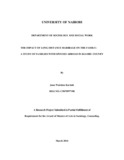| dc.description.abstract | The purpose of this study was to assess the impact of long distance marriages on the
families with spouses abroad in Kiambu County. Residents of this County are ambitious
hardworking and aggressive in exploring ventures deemed to improve social-economic
standards. The three main factors or reasons that contributed to individuals traveling abroad were
employment, education and career advancement. Despite outward mobility contributing
positively to the welfare of the family, it also had far reaching negative consequences. In order
to assess the impact of a spouse’s absence, three objectives guided this study that is; to analyze
the state of long distance marriages, to assess the effects of long distance marriage on the family
and thereafter to identify appropriate strategies to deal with challenges associated with long
distance marriages in the County. Four main components of family focused on in this study
were; couple’s relationship, parenting, finances and communication.
This descriptive research was conducted in Kiambu County in the central region of
Kenya. The target population comprised of married individuals living in the County who had
spouses abroad. Questionnaires with open and closed questions were used to collect data while
findings were presented by use of tables, graphs, pie charts and percentages. The study revealed
that (73%) females and (27%) males were left in the county presenting a form of “single hood”
for married individuals.
Three main factors/reasons contributed to a spouse’s outward mobility. These were;
employment at (68%), education (29%) and career advancement (27 %). Specifically the absence
of a spouse impacted negatively on a couple’s sexual relationship where (81%) of respondents
were sexually unfulfilled, (72%) were emotionally distant with the absent spouse while (45%)
cited the existence of infidelity in the family. Children who are significant members of a family
were equally affected by the absence of a parent. This was evidenced by (83%) of the
respondents saying that children were emotionally distant with the absent parent, (56%)
respondents said that children lacked models while (35%) of respondents said that children
became depressed. Family finances (51%) and communication (68%) were aspects of a family
affected by absence of spouse /parent as recorded by the respondents. In conclusion, families
must possess the following virtues to survive; trust (81%), honesty (67%), open communication
(57%) and integrity (48%). Family members must prepare adequately for a long distance
marriage by; attending counseling (70%), consulting with those in long distance marriage (59%),
consulting a religious leader (30%) and prayer. Respondents gave their peers the following
advice useful for strengthening their long distance relationships; seek reunion; trust each other,
being honest. They were informed that if they were not prepared to be left alone, they should
never get married. They should also learn to cope with the absence of a spouse positively.
Finally, the following recommendations were made; need for healthy communication, the
need for proper preparation prior to travel abroad by families attending counseling, sharing their
experiences with peers and consulting with religious leaders. Reunion should be the ultimate
goal for couples in long distance marriages. Further studies should be conducted focusing on the
absent spouse and singles in long distance relationships. | en_US |

